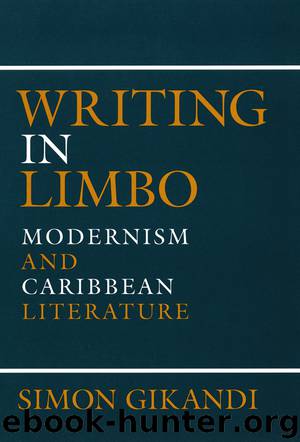Writing in Limbo by Simon Gikandi

Author:Simon Gikandi
Language: eng
Format: epub
Publisher: Cornell University Press
Published: 2018-01-09T00:00:00+00:00
The Modern Drama of Independence
A decolonized image of self remains an unfulfilled utopian impulse in Selvon’s early texts; what remains at the end of the quest for the modernist ideal (A Brighter Sun) and a return to the past (Turn Again Tiger) is the threat of dissolution. In spite of Tiger’s constant celebration of creolization as a topos for modernization, and hence its function as a force of differentiation—one that leads to the dissolution of traditional forms of life—the colonial subject’s quest for self-identity takes place within a shifting but unchanging context, that of sugar and the plantation system it engenders. If there is one special feature that defines the paradox of modernity in Selvon’s text, it is Tiger’s alternation between the dream of recapturing his self in a future realm of freedom and the need to recover an original, unalienated cultural source. Nevertheless, these ideals do not represent clear-cut alternatives. In A Brighter Sun, Tiger seeks his identity by rejecting the culture of the cane; in spite of the problems he encounters in trying to define himself in Barataria, any return to the plantation is considered regressive and unthinkable: “He considered going back to the canefields in Chaguanas, but the thought of it made him laugh aloud” (p. 215). If a return to the past holds only the possibility of repression, why does Tiger go back to the plantation in Turn Again Tiger?
In an insightful introduction to the novel, Sandra Pouchet Paquet has asserted that this turn backwards is a questioning of creolization as liberating praxis. She notes that the novel emphasizes “Tiger’s need to reconcile himself with his peasant roots in the cane community, as a vital and necessary grounding, if the process of creolization is not to lead to a crisis of disconnection and directionlessness” (p. vii). Indeed, it is important for Tiger to test his new knowledge against the power of tradition; his discourse even holds the possibility that tradition itself might be reformed through literacy and better management. The narrative itself, however, seems to counter any suggestion that the past may, in the end, prove to have any redemptive value. On the contrary, the image of the cane revives a communal history of total reification (p. 47).
But Tiger’s bitter memories of the canefields begin to lose their resonance in view of the modernizing process taking place in the sugar estates, a process that promises recompense for past suffering; indeed, he sometimes wavers between his historical knowledge of the cane as a force that represses identities and his dream that cane might indeed become a source of pleasure (p. 143). And in the end, because he realizes he cannot escape from the plantation system, Tiger will “modernize” the colonized space in his imagination, representing it as an agrarian landscape with a teleological value that is definitely utopian: “Urmilla was bearing another child, perhaps the greatest thing of all. And the very earth had done a job, bearing the cane that made the harvest possible” (p. 181).
Download
This site does not store any files on its server. We only index and link to content provided by other sites. Please contact the content providers to delete copyright contents if any and email us, we'll remove relevant links or contents immediately.
| Ancient & Classical | Arthurian Romance |
| Beat Generation | Feminist |
| Gothic & Romantic | LGBT |
| Medieval | Modern |
| Modernism | Postmodernism |
| Renaissance | Shakespeare |
| Surrealism | Victorian |
4 3 2 1: A Novel by Paul Auster(12391)
The handmaid's tale by Margaret Atwood(7763)
Giovanni's Room by James Baldwin(7346)
Asking the Right Questions: A Guide to Critical Thinking by M. Neil Browne & Stuart M. Keeley(5775)
Big Magic: Creative Living Beyond Fear by Elizabeth Gilbert(5771)
Ego Is the Enemy by Ryan Holiday(5447)
The Body: A Guide for Occupants by Bill Bryson(5096)
On Writing A Memoir of the Craft by Stephen King(4943)
Ken Follett - World without end by Ken Follett(4731)
Adulting by Kelly Williams Brown(4574)
Bluets by Maggie Nelson(4556)
Eat That Frog! by Brian Tracy(4538)
Guilty Pleasures by Laurell K Hamilton(4448)
The Poetry of Pablo Neruda by Pablo Neruda(4106)
Alive: The Story of the Andes Survivors by Piers Paul Read(4031)
White Noise - A Novel by Don DeLillo(4009)
Fingerprints of the Gods by Graham Hancock(4004)
The Book of Joy by Dalai Lama(3986)
The Bookshop by Penelope Fitzgerald(3852)
